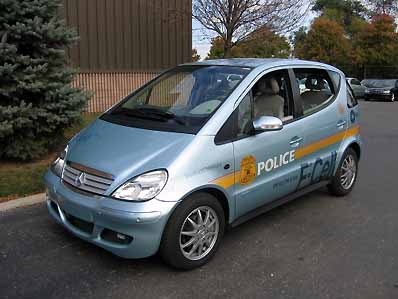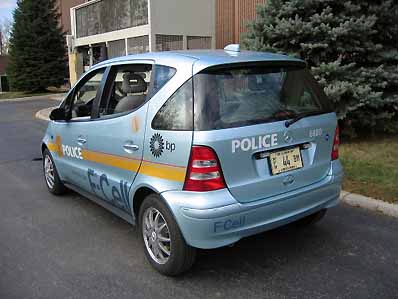
The
Stuttgart-based brand
DaimlerChrysler
has the largest fleet of fuel cell vehicles in the world - more than
100
DaimlerChrysler
works with Wayne State University in Michigan to mature fuel cell vehicle
technology
More than
$1 billion invested in fuel cell technology and more than 1.2 million miles
logged |
DaimlerChrysler Builds First Fuel Cell-Powered
Police Car
DaimlerChrysler
has introduced the first fuel cell-powered police vehicle to the world. The
Wayne State University Police Department in Detroit will operate the Mercedes
F-Cell as a supervisor's vehicle on and in the immediate vicinity of the
campus, located in Detroit's Cultural Center.
 Outfitted with a third-generation police radio, decals,
lights and sirens, the Wayne State University Police Department F-Cell is
a look into the future use of fuel cell vehicles. The demanding operation
of a police car will produce valuable data to help develop fuel cell technology.
"This event exhibits how DaimlerChrysler is taking on the challenge for
industries and governments to create viable alternative-fuel solutions,"
said Mark Chernoby, Vice President - Advance Vehicle Engineering, Chrysler
Group. "We're pleased to be a driving force in this team effort to develop
zero-emissions transportation." The Wayne State Police Department F-Cell
vehicle will be refueled at NextEnergy's new hydrogen fueling station. The
car will serve as a learning laboratory for students in WSU College of
Engineering Alternative Energy Technology, the nation's first
master’s-degree program in alternative energy. DaimlerChrysler has spent
more than $1 billion in fuel cell vehicle research and development. No other
manufacturer has accumulated more data or driven more zero-emissions miles
- more than 1.2 million. The DaimlerChrysler fuel cell vehicle fleet is diverse
- in addition to several research vehicles, it also includes medium-duty
fuel cell Dodge Sprinter vans and more than 35 Mercedes-Benz Citaro fuel
cell buses, which operate in Europe, the United States, Japan, Australia
and Singapore. Outfitted with a third-generation police radio, decals,
lights and sirens, the Wayne State University Police Department F-Cell is
a look into the future use of fuel cell vehicles. The demanding operation
of a police car will produce valuable data to help develop fuel cell technology.
"This event exhibits how DaimlerChrysler is taking on the challenge for
industries and governments to create viable alternative-fuel solutions,"
said Mark Chernoby, Vice President - Advance Vehicle Engineering, Chrysler
Group. "We're pleased to be a driving force in this team effort to develop
zero-emissions transportation." The Wayne State Police Department F-Cell
vehicle will be refueled at NextEnergy's new hydrogen fueling station. The
car will serve as a learning laboratory for students in WSU College of
Engineering Alternative Energy Technology, the nation's first
master’s-degree program in alternative energy. DaimlerChrysler has spent
more than $1 billion in fuel cell vehicle research and development. No other
manufacturer has accumulated more data or driven more zero-emissions miles
- more than 1.2 million. The DaimlerChrysler fuel cell vehicle fleet is diverse
- in addition to several research vehicles, it also includes medium-duty
fuel cell Dodge Sprinter vans and more than 35 Mercedes-Benz Citaro fuel
cell buses, which operate in Europe, the United States, Japan, Australia
and Singapore. |
 As part of the world's largest fleet of fuel cell
vehicles, DaimlerChrysler has more than 25 fuel cell vehicles in customer
hands in California and more than 100 around the world. No other manufacturer
comes close to the efforts of DaimlerChrysler with fuel cell technology.
The Mercedes F-Cell is a reflection of DaimlerChrysler's leadership in fuel
cell technology. The entire fuel cell system is housed in the floor of the
vehicle, leaving full use of the passenger and cargo spaces. It has a range
of approximately 100 miles and a top speed of 85 mph. The electric motor
develops 88 hp (65 kW), enabling acceleration from 0 to 60 mph in 16 seconds.
The stack has been developed by the DaimlerChrysler cooperation partner,
Ballard Power Systems. DaimlerChrysler supports Governor Arnold Schwarzenegger's
efforts and goals. His California Hydrogen Highway Network - in addition
to other programs the company is involved with, including those with the
Department of Energy and the Environmental Protection Agency - enables
DaimlerChrysler and its partners to gain extensive operational familiarity
with fuel cell vehicles and hydrogen refueling stations. DaimlerChrysler
pioneered fuel cell vehicle technology more than a decade ago. Fuel cells
release energy from the reaction of hydrogen with a catalyst and oxygen.
This clean technology operates at a high level of efficiency and is true
zero-emissions. Hydrogen-powered fuel cell vehicles emit only pure water
vapor as exhaust. Fuel cell vehicles are part of DaimlerChrysler's advanced
propulsion technology umbrella, which includes efficient gasoline engines,
advanced diesels, Flex-Fuel and hybrid power-train systems. As part of the world's largest fleet of fuel cell
vehicles, DaimlerChrysler has more than 25 fuel cell vehicles in customer
hands in California and more than 100 around the world. No other manufacturer
comes close to the efforts of DaimlerChrysler with fuel cell technology.
The Mercedes F-Cell is a reflection of DaimlerChrysler's leadership in fuel
cell technology. The entire fuel cell system is housed in the floor of the
vehicle, leaving full use of the passenger and cargo spaces. It has a range
of approximately 100 miles and a top speed of 85 mph. The electric motor
develops 88 hp (65 kW), enabling acceleration from 0 to 60 mph in 16 seconds.
The stack has been developed by the DaimlerChrysler cooperation partner,
Ballard Power Systems. DaimlerChrysler supports Governor Arnold Schwarzenegger's
efforts and goals. His California Hydrogen Highway Network - in addition
to other programs the company is involved with, including those with the
Department of Energy and the Environmental Protection Agency - enables
DaimlerChrysler and its partners to gain extensive operational familiarity
with fuel cell vehicles and hydrogen refueling stations. DaimlerChrysler
pioneered fuel cell vehicle technology more than a decade ago. Fuel cells
release energy from the reaction of hydrogen with a catalyst and oxygen.
This clean technology operates at a high level of efficiency and is true
zero-emissions. Hydrogen-powered fuel cell vehicles emit only pure water
vapor as exhaust. Fuel cell vehicles are part of DaimlerChrysler's advanced
propulsion technology umbrella, which includes efficient gasoline engines,
advanced diesels, Flex-Fuel and hybrid power-train systems. |
| DaimlerChrysler Communications,
Stuttgart (Germany), Auburn Hills (USA), April 07, 2006 |
Back to
Top |
